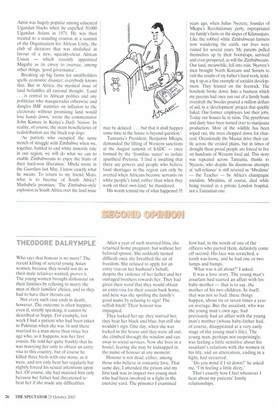THEODORE DALRYMPLE
Who says that honour is no more? The recent killing of several young Asian women, because they would not do as their male relatives wanted, proves it. The young women brought dishonour on their families by refusing to marry the men of their families' choice, and so they had to have their throats cut.
Not every such case ends in death, however. The outcome is often happier, even if, strictly speaking, it cannot be described as happy. For example, last week I had a patient who had been taken to Pakistan when she was 46 and there married to a man more than twice her age who, as it happens, was her first cousin. He told her quite frankly that he was marrying her only to obtain an entry visa to this country, but of course he killed three birds with one stone, as it were, and not only beat her regularly but nightly forced his sexual attentions upon her. Of course, she had married him only because her father had threatened to beat her if she made any difficulties. After a year of such married bliss, she returned home pregnant, but without her beloved spouse. She suddenly turned difficult once she breathed the air of freedom. She refused to apply for an entry visa on her husband's behalf, despite the violence of her father and her outraged brothers towards her. They had given their word that they would obtain an entry visa for their cousin back home, and here was she spoiling the family's good name by refusing to sign! The selfish bitch! Their honour was impugned.
They locked her up, they starved her, they beat her black and blue, but still she wouldn't sign. One day, when she was locked in the house and they were all out, she climbed through the window and ran away to social services. Now she lives in a hostel, fearing she may be kidnapped in the name of honour at any moment.
Honour is not dead, either, among those who believe in romantic love. That same day, I attended the prison and my first task was to inspect two young men who had been involved in a fight in the exercise yard. The prisoner I examined first had, in the words of one of the officers who parted them, definitely come off second. His face was scratched, a tooth was loose, and he had one or two lumps and bumps.
'What was it all about?' I asked.
It was a love story. The young man's assailant had started an affair with his baby-mother — that is to say, the mother of his two children. In itself, that was not so bad: these things happen, about six or seven times a year on average. But the assailant, who was the young man's own age, had previously had an affair with the young man's mother (whose baby-father had, of course, disappeared at a very early stage of the young man's life). The young man, perhaps not surprisingly, was feeling a little sensitive about his assailant's relations with the women in his life, and an altercation, ending in a fight, had occurred.
'Do you mind if I sit down?' he asked me. `I'm feeling a little dizzy.'
That's exactly how I feel whenever I hear about my patients' family relationships.


































































































 Previous page
Previous page